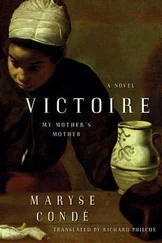At present the Home was looking so good it would have been the pride of Dakar. Under the late Desrussie, an epidemic of yaws would follow an epidemic of yellow fever. It was better not to count the number of dead. Once they had buried thirty in a single month. Under Celanire’s radiating care the children glowed with health and cleanliness. A group of small children under the charge of two assistants was sitting in a circle on the lawn singing “Frère Jacques” in their delightful little voices. Some of the older boys were marching off in manly fashion to the fields, hoe in hand. The bamboo grove, the young palm trees, and the budding orchard were another treat for the eyes. Celanire had taken advantage of the dry season to have the facade repainted in a very pale eggshell tint edged with dark red. Her choice of unusual colors was evidence of her exquisite taste, which made her so precious to Thomas. It was obvious the meager allowance attributed to running the Home couldn’t possibly have been enough to cover all these improvements, and going over the colony’s accounts with a fine-toothed comb would have turned up quite a few surprises.
Celanire was resting in a boudoir, draped in a kimono of black silk, a color she seemed to like, embroidered with red roses and buttercups. If it hadn’t been for her wide, somewhat triangular nose and her very full lips, she could have been mistaken for an Indian from the French trading posts of Pondicherry, Kana Kal, and Manahe. Thomas smothered her with kisses, then got control of himself and pulled the telegram out of his pocket. Celanire shrugged her shoulders and vaguely asked a few questions. Where exactly was Governor Pol-Roger? Thomas explained he was in Felkessekaha among the Niarafolo Senufo natives. As if this was of no interest to her, she changed the subject. She was thinking of going to the wake for Senanou and Dabla as a way of expressing her condolences to the family. What did he think of the idea? Thomas uttered a shrill cry: Was she out of her mind? The Africans hated her. She would be stoned to death.
In fact hostilities had been declared for some time now between Celanire and the Africans. Celanire had proclaimed loud and clear she had no intention of letting the girls in her care be sexually mutilated. Going by what she said, the very fact that the mothers let their offspring be placed in the Home for Half-Castes by their French papas meant they renounced de facto all their rights, and the children became the sole responsibility of the French administration. Obviously, such quibbling had not made the slightest impression. While the innocent six-year-old Marie-Angélique was spending the weekend with her family, they had grabbed the opportunity to put her under the excision knife. She had almost died from a hemorrhage. In a fit of anger, Celanire forbade her boarders to leave the Home from that moment on and only allowed family visits once every three months. Although some families were not bothered by these rules, others, as you can imagine, raised a hue and cry. Half-caste or not, some mothers were fond of their little darlings and accused Celanire of sequestering them. They camped outside the Home in tears. The courts were bombarded with complaints, and Thomas had great trouble getting the fact accepted that his mistress was within her rights.
Thomas had already noticed that Celanire was a stubborn woman who did just what she liked. Without paying the slightest heed to his objections, she drew him close to her.
Making love to Celanire was a delight Thomas could never have imagined even in his wildest dreams. Deep down he called her “my little panther” because he never knew whether her embrace would make him moan with pain or pleasure. When his strength gave out, she asked for more. At the very end she left him exhausted, worn out, deliciously dead.
Betti Bouah’s house made the Africans proud and left the Europeans stunned. It had been built by Appolonian workers from Cape Coast in the Gold Coast and comprised an upper floor that was reached by a dual staircase mounted with open fretwork wooden balustrades. The living room where the children’s bodies lay was richly furnished in the European style with rugs, sofas, and armchairs. Low tables were covered in crocheted doilies. There were no less than five clocks and four music boxes fixed to the wall, plus portraits of Napoleon at Arcole, Napoleon Bonaparte Emperor, Treich-Laplène, Binger, Queen Victoria, and gilt-framed round mirrors surmounted by an imperial spread eagle. The showpiece was a sideboard with a display of blue-stemmed crystal glasses. Like all rich merchants, Betti Bouah had collected every gift he had received from his European customers in the same room. Owing to his status in society, people had come from the surrounding villages and even as far away as the Alladian shores, draped in their mourning robes. According to custom, the assembly was divided strictly in two. Inside the house, the women, mothers, stepmothers, and aunts of the little victims. Outside on the verandas, the men. The latter were frantically interrogating Hakim on how to rid themselves of the French. But contrary to what Thomas had been told, Hakim had absolutely nothing to offer and stammered out a series of platitudes. So the more the evening dragged on, the angrier they felt in their helplessness and the faster the calabashes of palm wine were passed around. The fact that Tanella had been handed over to the French authorities did not calm them down. The French had no business meddling in this affair. It was a matter for the native courts. Betti Bouah had consulted with his lawyer in Bordeaux, who advised him to lodge a complaint with the governor-general of French West Africa. And he had got nowhere with Koffi Ndizi, who did not understand a thing about “white men’s business,” as he liked to say.
When around ten o’clock in the evening Celanire made her entrance, the buzz of conversation abruptly stopped. Those who had a cutlass handy thought of using it. But she had such a gentle look about her, they had second thoughts. She avoided making any sign of the cross or genuflection that might shock these heathens and remained standing, head lowered, in front of the children’s bodies. Then, using the widow Desrussie as interpreter, she asked to go and join the women. To do so she had to walk past Koffi Ndizi, spilling out of his armchair, and she nodded her head in respect while the king, seeing her for the first time, stared, openmouthed. Hakim was the only one who believed Celanire had come to thumb her nose at them and see how good she was at getting them to change their minds. For those who had quickly badmouthed her behind her back now retracted and spoke highly of her beauty. Koffi Ndizi even declared that the fetish priests had been wrong and such a lovely individual could never be the “horse” of the aawabo, the evil spirits. Some daydreamed out loud and wondered whether she would agree to marry an African. After all, she was as black as they were! However hard a group of elders recalled that a woman’s beauty is a man’s misfortune, nobody paid attention to these sayings of another age. When Celanire emerged from the women’s quarters, Koffi Ndizi ordered Hakim to accompany her home, seeing how late it was.
The night crackled with the cries of insects. The moon had hidden her face behind a crepe of clouds. In the darkness Celanire laid her hand on Hakim’s arm, which immediately became burning hot from her touch. It was as if he were standing next to a fire. She spoke to him in a mellow voice: That wake reminded her of Guadeloupe. There too, death was highly respected. At All Saints the flames of the candles stretched over the graves like a diamond necklace. Oh, sometimes she felt like ditching everything and going back home. But did she have a home? A home is a maman and a papa waiting for you with open arms. Those who had adopted her now slept in the shade of the casuarinas. And then seven years, seven long years, had elapsed since leaving Guadeloupe. When you’re separated from a place for such a long time, you lose it forever: everything changes, nothing is the same. Listening to her sugary words, Hakim thought it was a good thing Governor Alix Pol-Roger was coming back soon. If he had any sense, neither Thomas de Brabant nor Celanire would be welcome much longer in Adjame-Santey.
Читать дальше












